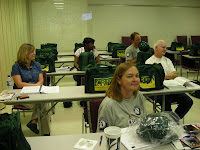General Preparedness
Generally, there are things you can do to prepare for most all emergencies. The Jackson-Madison County Emergency Management Agency encourages individuals and families to plan ahead by doing the following:
• Write a plan. Writing a plan formalizes ideas and sets up a uniform way of responding to an emergency. Organized action is important. In an emergency, seconds can save lives. People do what they practice, and in the confused aftermath of a disaster, instinct brought about by practice takes over.
• Make a plan for fire, power outages, tornado, flood, earthquakes and other disasters which threaten you. Involve each person in your family, no matter what their age or ability. Plan in advance. Practice the plan and follow the plan when the emergency presents itself.
• At home, prepare for each family member a Grab-and-Go Kit with a 3-day supply of food, water, clothes, medicine, baby items, etc. If you evacuate your home, it keeps you self sufficient until your family is reassembled and settled.
• Establish a rendezvous point just outside the home (the mail box, for example, where everyone meets and counts heads after leaving the house because of a fire). This allows quick identification of who is missing-vital information for rescuers.
• Also establish a meeting place 1-2 miles from home (a friend's or relative's house, for example, where family members can assemble if access to their home is impossible because of destruction and danger). It may be unlikely that both places will be affected by the same disaster and this immediately gives your family a place to assemble. Also, it is not too far to walk.
• Designate an out-of-town family member who can contact other relatives. A central contact can call the many distant relatives who otherwise would all be trying to call the devastated area. Phone systems may be damaged, and after disasters they are typically overloaded for days. Try to establish contact with your designated out-of town family member and let them know how you are doing, so they can pass this information on to others that will worry about your well-being.
• Get a NOAA Weather Radio, first aid supplies & flashlight with batteries. Safeguard vital records, keys, cash, credit cards, etc. Keep emergency supplies and equipment in your car.
• If you do not have to evacuate your home, make sure that you have a phone available that plugs into a telephone jack into the wall. If you have no electrical power, your cordless phones will not work. Make certain that you have the ability to communicate with the outside world, especially emergency response agencies.
• Include in your plan the purchase of insurance. Some individuals devastated by the 1989 tornado which hit the City of Huntsville did not have insurance and consequently lost their homes, businesses, and their possessions. Apartment dwellers can even get insurance. It is also a good idea to maintain an inventory of your belongings via photographs, video camera, or a written list. Put your inventory information in a safe place such as a bank box or vault. If you live in an area that typically floods, you may consider getting flood insurance. For more details about the National Flood Insurance Program, you may contact your insurance agent.
• After a disaster, account for your family; check on your neighbors; render aid as needed; and notify authorities. Assemble your family; reestablish a safe physical/emotional home environment and notify/reassure relatives.


 Disaster Preparation
Disaster Preparation



 Welcome to the Jackson-Madison Co. / Tennessee Homeland Security District 10 CERT
Welcome to the Jackson-Madison Co. / Tennessee Homeland Security District 10 CERT

 eNewsletter. It is my hope you find this product useful in finding out more about CERT and CERT activities in our area. Please bookmark this page and refer to it often to get the latest news about Jackson-Madison Co./District 10 CERT.
eNewsletter. It is my hope you find this product useful in finding out more about CERT and CERT activities in our area. Please bookmark this page and refer to it often to get the latest news about Jackson-Madison Co./District 10 CERT.